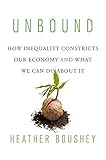Unbound: how inequality constricts our economy and what we can do about it
Material type: TextPublication details: Harvard University Press 2019 CambridgeDescription: xvi, 275 p.: ill. Includes indexISBN:
TextPublication details: Harvard University Press 2019 CambridgeDescription: xvi, 275 p.: ill. Includes indexISBN: - 9780674919310
- 339.20973 B6U6
| Item type | Current library | Collection | Call number | Status | Date due | Barcode | Item holds | |
|---|---|---|---|---|---|---|---|---|
 Book
Book
|
Ahmedabad General Stacks | Non-fiction | 339.20973 B6U6 (Browse shelf(Opens below)) | Available | 203613 |
Browsing Ahmedabad shelves, Shelving location: General Stacks, Collection: Non-fiction Close shelf browser (Hides shelf browser)

|
No cover image available | No cover image available |

|

|

|

|
||
| 339.2 T2T3 Termites of the state: why complexity leads to inequality | 339.2 W3A7 Approach to the theory of income distribution | 339.20954 I6C6-1 Committee on regional accounts | 339.20973 B6U6 Unbound: how inequality constricts our economy and what we can do about it | 339.22 A8I6 Inequality: what can be done | 339.22 P4E2 The economics of inequality | 339.2208900973 T3V2 The vanishing middle class: prejudice and power in a dual economy |
Table of content
Part I. How inequality obstructs
1. Learning and human capital
2. Skills, talent, and innovation
Part II. How inequality subverts
3. Public spending
4. Market structure
Part III. How inequality distorts
5. The economic cycle
6. Investment
Conclusion: The economic imperative of equitable growth
From one of Washington’s most influential voices on economic policy, a lively and original argument that reducing inequality is not just fair but also key to delivering broadly shared economic growth and stability.
Do we have to choose between equality and prosperity? Many think that reducing economic inequality would require such heavy-handed interference with market forces that it would stifle economic growth. Heather Boushey, one of Washington’s most influential economic voices, insists nothing could be further from the truth. Presenting cutting-edge economics with journalistic verve, she shows how rising inequality has become a drag on growth and an impediment to a competitive United States marketplace for employers and employees alike.
Boushey argues that inequality undermines growth in three ways. It obstructs the supply of talent, ideas, and capital as wealthy families monopolize the best educational, social, and economic opportunities. It also subverts private competition and public investment. Powerful corporations muscle competitors out of business, in the process costing consumers, suppressing wages, and hobbling innovation, while governments underfund key public goods that make the American Dream possible, from schools to transportation infrastructure to information and communication technology networks. Finally, it distorts consumer demand as stagnant wages and meager workplace benefits rob ordinary people of buying power and pushes the economy toward financial instability.
Boushey makes this case with a clear, accessible tour of the best of contemporary economic research, while also injecting a passion for her subject gained through years of research into the economics of work–life conflict and policy work in the trenches of federal government. Unbound exposes deep problems in the U.S. economy, but its conclusion is optimistic. We can preserve the best of our nation’s economic and political traditions, and improve on them, by pursuing policies that reduce inequality—and by doing so, boost broadly shared economic growth.
https://www.hup.harvard.edu/catalog.php?isbn=9780674919310
There are no comments on this title.

